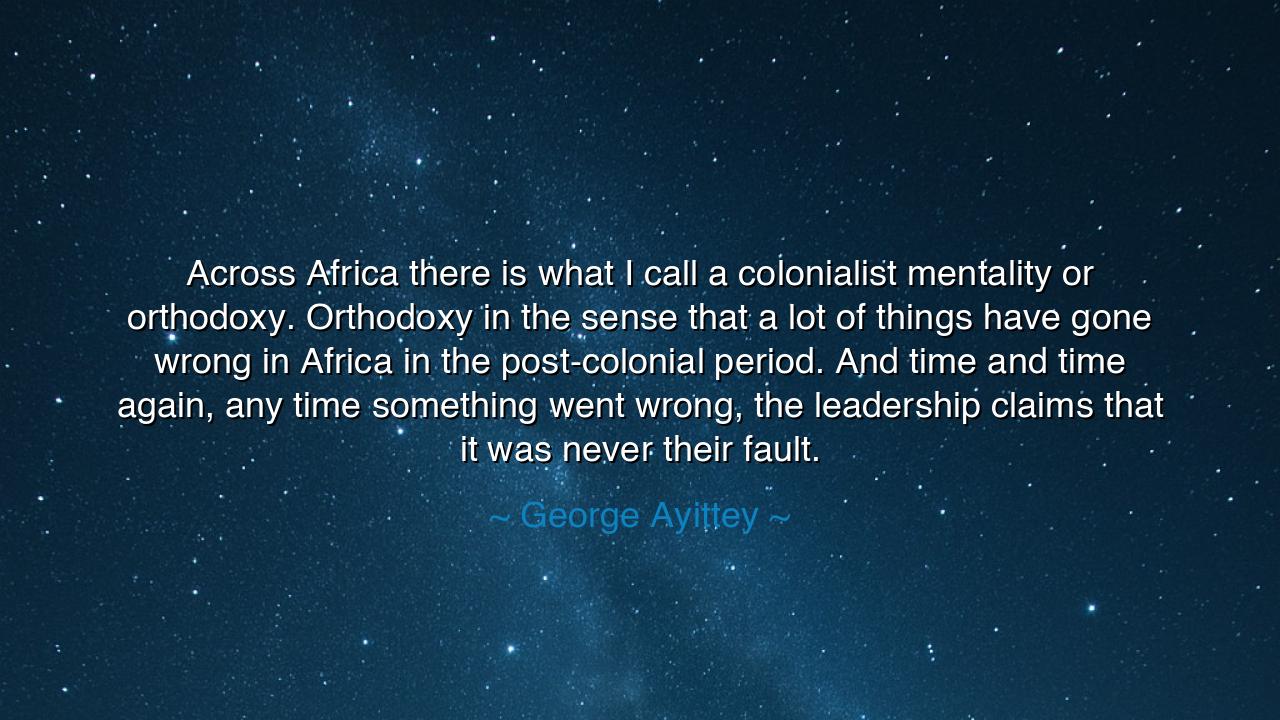
Across Africa there is what I call a colonialist mentality or
Across Africa there is what I call a colonialist mentality or orthodoxy. Orthodoxy in the sense that a lot of things have gone wrong in Africa in the post-colonial period. And time and time again, any time something went wrong, the leadership claims that it was never their fault.






Hear, O children of the mother continent and seekers of truth, the words of George Ayittey, the wise economist and son of Africa, who spoke not in bitterness but in courage: “Across Africa there is what I call a colonialist mentality or orthodoxy. Orthodoxy in the sense that a lot of things have gone wrong in Africa in the post-colonial period. And time and time again, any time something went wrong, the leadership claims that it was never their fault.” These words are both a lament and a summons — a call to awaken from the long shadow of blame, and to reclaim the power of responsibility.
The meaning of this quote lies in its confrontation with illusion — the illusion that the wounds of the past forever excuse the failures of the present. Ayittey speaks of a “colonialist mentality,” not as a relic of foreign rule, but as a ghost that still lingers in the minds of leaders and nations. It is the habit of seeing weakness as destiny, of pointing to history rather than to one’s own hands. To him, this is the great orthodoxy — the unquestioned belief that the problems of Africa are always caused by others, never by her own sons and daughters. Such thinking, he warns, shackles the continent more effectively than any foreign chain.
The origin of Ayittey’s words lies in his lifelong battle against corruption, stagnation, and intellectual dependency in post-colonial Africa. Born in Ghana, educated in both Africa and abroad, he saw clearly the twin tragedies of his time — that while colonialism had indeed wounded the continent, its deeper suffering came from leaders who refused to heal it. Again and again, he witnessed nations blessed with abundance fall into poverty, not from lack of resources, but from lack of accountability. His writings, especially in Africa Unchained and Africa in Chaos, carried a consistent cry: “We have blamed others too long. Now we must fix ourselves.”
To understand his message, look to history. When the colonial powers departed, they left behind borders and institutions that were often fragile and artificial. But they also left behind an opportunity — the chance for Africa to define itself anew. Yet many post-independence leaders, rather than building societies of freedom and integrity, built empires of fear and privilege. When economies faltered or conflicts erupted, the refrain was always the same: “It is the fault of colonialism. It is the West. It is the outsiders.” Thus, the past became a shield for present corruption, and responsibility became a stranger in the house of leadership.
Yet Ayittey was not a voice of despair. His words carry the spirit of a reformer and a patriot. He believed that Africa’s renewal would come not from foreign aid, nor from self-pity, but from what he called the “cheetah generation” — the young men and women who would move swiftly, think freely, and take ownership of their destiny. He urged Africans to rediscover the wisdom of their ancestors — the market towns, village councils, and communal ethics that once sustained civilizations before colonial borders. The path to freedom, he said, begins when a people take full responsibility for their future, unafraid to say, “The fault is ours — and so is the power to change.”
This truth is not for Africa alone, but for all humanity. Every nation, every people, carries its own colonialist mentality — a tendency to blame others for misfortune, to excuse weakness through history. Yet greatness belongs to those who turn pain into purpose. Consider Japan after its devastation in World War II: instead of wallowing in defeat, its leaders rebuilt their land through discipline, education, and innovation. Consider Germany, which after ruin and shame, rose again by facing its past with honesty. These examples show what Ayittey meant: that history’s weight can either crush a people or forge them into steel.
Thus, O listener, what lesson shall you draw from this? It is this: never mistake blame for progress. To seek the cause of suffering is wise; to cling to it as justification is ruin. The strength of a people lies not in the grievances they remember, but in the courage with which they rise above them. The moment one says, “It was not my fault,” one also says, “It is not my power.” But when one declares, “It is in my hands,” then destiny itself begins to move.
So remember the wisdom of George Ayittey, son of Africa and champion of accountability: the chains that bind a nation are not only forged by its oppressors, but by the excuses of its own leaders. Let the past be honored, not worshipped; let blame give way to building. And let every heart, whether in Africa or beyond, learn this eternal truth — that freedom begins the moment a people stop pointing outward and start working inward. For no continent, no soul, can rise until it learns to say: The fault is mine — therefore, the future is mine also.






AAdministratorAdministrator
Welcome, honored guests. Please leave a comment, we will respond soon